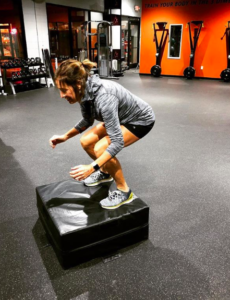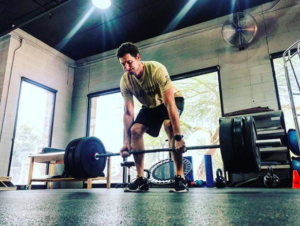We get asked this question all the time, but it’s important for us to have a little background about you before we can make suggestions. There are three main questions that help us determine what will be the best routine for you.
1 – What is your fitness history and/or your current routine?

Plenty of clients walk through our doors having not worked out in 5-10 years, while others are looking for a change to supplement a 6-7 workouts/week schedule. We ease the beginner clients into a plan that works for their lifestyles because ramping up steadily is more effective than “too much too soon.” While some need to proceed with caution, others can easily transition into a rigorous routine fairly quickly. No matter what plan we decide on together, it is ultimately our job to keep our clients safe during each workout. We’ll use many cues to know how a person is handling the workout each day.
For those that are starting from scratch and have not been following a plan, it’s best to ease into it and set goals that are reachable on the short term, and re-evaluate as progress is made. Often people jump from having no routine to attempting to commit to 7 days a week and find themselves failing early on. Lofty New Years goals in January all too often end up forgotten by February. If you’re building from not having a regular fitness practice, 2-3 days a week is a great start! Stick with that for a month or even longer, make it a routine. Its a progression and a lifestyle change, so make sure it’s realistic and something you could do forever!
2 – What are your goals?
What are you looking to get out of a new workout plan? Is it weight loss, strength gains, or just feeling better? Whatever it is, make your goals realistic and use timeline based tiers to measure progress – 2 months in, one year in, and 5 years down the road. It’s most important to just stick with it and maintain a rhythm that works for you. No plan is successful if you don’t keep at it. Fitness and nutrition shouldn’t have a start and finish, they must be a lifestyle change that allows for growth and adaptation.

If you are just looking for maintenance and a healthy fitness routine, 2-3 times per week is sufficient. To really see gains and improvements you need to hit 4-5 workouts per week.
Of course, goals discussions become much more in depth and personalized if we get into questions of strength vs endurance training or bulking up vs toning the body. The best routine to keep overall fitness includes a variety of workout types – you need to work strength, you need a cardiovascular base, you need a strong core, along with balance and mobility.
Strength Coach Tony Gentilcore spoke about goals in an article from BodyBuilding.com:
“Setting quantifiable goals is my favorite tactic to motivate clients. A prime is example is when I have female clients focus on a specific goal like performing a single bodyweight chin-up. I prefer these types of goals over worrying about scale weight, which usually causes damaging mind games.”
3 – What is your schedule?
Sometimes people are not realistic about their schedule – on both ends of the spectrum! I’ve seen some on a crazy work schedule with a busy family schedule try to take on an Ironman. I’ve also seen those with tons of free time come up with every excuse manageable.
While scheduling is about setting realistic goals, it’s also about having the right mindset. Often times people say they are ready to start a new workout plan and get into a routine, but mentally, they are not quite there yet. Know up front that excuses are only keeping you from you, and you may eventually need to rearrange your priorities. We know that this is a process, and you are reading this because you are ready to start it. Keeping a realistic schedule in mind will allow you to actually reach goals and build off of them as you approach a new lifestyle, mentality, and level of wellness.
Strength Coach Dean Somerset talks about consistency in an interesting way:
“Consider working out like saving for retirement. You won’t get there with one paycheck. It takes time, attention, and most importantly, consistency. The fittest people I work with don’t train the hardest every time, but they train the most consistently and remain focused. You don’t need to feel like you just went 10 rounds with Mike Tyson to have an effective workout. Just stay the course!”
There is a lot to consider when determining a weekly workout routine, and with a little bit of background we can easily guide you to a safe and effective plan that will lead you to a lifestyle of health and fitness.
